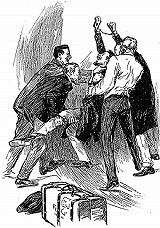Gregson and Lestrade seemed to be far from satisfied by this assurance, or by the depreciating allusion to the detective police. The former had flushed up to the roots of his flaxen hair, while the other’s beady eyes glistened with curiosity and resentment. Neither of them had time to speak, however, before there was a tap at the door, and the spokesman of the street Arabs, young Wiggins, introduced his insignificant and unsavoury person.
“Please, sir,” he said, touching his forelock, “I have the cab downstairs.”
“Good boy,” said Holmes, blandly. “Why don’t you introduce this pattern at Scotland Yard?” he continued, taking a pair of steel handcuffs from a drawer. “See how beautifully the spring works. They fasten in an instant.”
“The old pattern is good enough,” remarked Lestrade, “if we can only find the man to put them on.”
“Very good, very good,” said Holmes, smiling. “The cabman may as well help me with my boxes. Just ask him to step up, Wiggins.”
I was surprised to find my companion speaking as though he were about to set out on a journey, since he had not said anything to me about it. There was a small portmanteau in the room, and this he pulled out and began to strap. He was busily engaged at it when the cabman entered the room.
“Just give me a help with this buckle, cabman,” he said, kneeling over his task, and never turning his head.
The fellow came forward with a somewhat sullen, defiant air, and put down his hands to assist. At that instant there was a sharp click, the jangling of metal, and Sherlock Holmes sprang to his feet again.
“Gentlemen,” he cried, with flashing eyes, “let me introduce you to Mr. Jefferson Hope, the murderer of Enoch Drebber and of Joseph Stangerson.”

The whole thing occurred in a moment - so quickly that I had no time to realize it. I have a vivid recollection of that instant, of Holmes’s triumphant expression and the ring of his voice, of the cabman’s dazed, savage face, as he glared at the glittering handcuffs, which had appeared as if by magic upon his wrists. For a second or two we might have been a group of statues. Then with an inarticulate roar of fury, the prisoner wrenched himself free from Holmes’s grasp, and hurled himself through the window. Woodwork and glass gave way before him; but before he got quite through, Gregson, Lestrade, and Holmes sprang upon him like so many staghounds. He was dragged back into the room, and then commenced a terrific conflict. So powerful and so fierce was he that the four of us were shaken off again and again. He appeared to have the convulsive strength of a man in an epileptic fit. His face and hands were terribly mangled by his passage through the glass, but loss of blood had no effect in diminishing his resistance. It was not until Lestrade succeeded in getting his hand inside his neckcloth and half-strangling him that we made him realize that his struggles were of no avail; and even then we felt no security until we had pinioned his feet as well as his hands. That done, we rose to our feet breathless and panting.
“We have his cab,” said Sherlock Holmes. “It will serve to take him to Scotland Yard. And now, gentlemen,” he continued, with a pleasant smile, “we have reached the end of our little mystery. You are very welcome to put any questions that you like to me now, and there is no danger that I will refuse to answer them.”